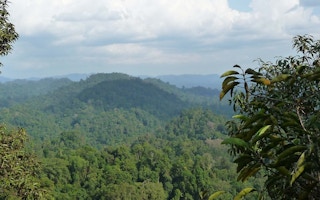In what conservationists are hailing as a major breakthrough in efforts to protect Sumatra’s fast-dwindling lowland rainforests, the Indonesian government on Wednesday finally approved an ecosystem restoration license for more than 44,000 hectares (110,000 acres) of forest bordering Bukit Tigapuluh, a national park renowned for its rich wildlife.
After a long-running tug-of-war between plantation companies and conservationists over the right to manage the area, Indonesia granted the license to PT Alam Bukit Tigapuluh, a for-profit company established by a coalition of environmental organizations, including World Wildlife Fund (WWF), Frankfurt Zoological Society (FZS), The Orangutan Project, and Rainforest Trust, with the support of the Leonardo DiCaprio Foundation and other groups.
The license allows the company to pursue activities that protect and restore forests that have been degraded by encroachment and logging. According to WWF, these activities may include “selling rattan, tapping shade-grown ‘jungle rubber’ and harvesting medicinal plants in the forest” as well as eco-tourism.
The initiative should better secure critical habitat for endangered elephants, tigers, orangutans, rhinos, and tapirs in Bukit Tigapuluh, which is effectively an island amid large-scale deforestation across Sumatra. Satellite data shows that Sumatra lost more than half its lowland forests since 1985.
“
Our work to protect this area is an example of what can be accomplished when concerned organizations, governments and individuals work together to create a future where both nature and people can thrive.
Leonardo DiCaprio, Hollywood actor
Given the dire state of Sumatran forests, the development was immediately welcomed by conservationists involved with the initiative.
“Sumatra has reached a tipping point in the fight to save its wildlife. Without adequate protection, many of the planet’s most iconic species face an uncertain future,” said Rainforest Trust CEO Paul Salaman in a statement.
“This new purchase is a major step in the right direction. It demonstrates that concrete land protection can still be achieved in Sumatra in an economical and effective way.”
“This incredible place—where elephants, orangutans and tigers coexist in the wild—is also one of the most threatened,” said actor Leonardo DiCaprio in a statement.
“Our work to protect this area is an example of what can be accomplished when concerned organizations, governments and individuals work together to create a future where both nature and people can thrive.” DiCaprio is a member of WWF’s board and the founder of the foundation bearing his name.
Conservationists say the project offers the potential to help specific animal species, including Sumatran elephants that have suffered substantial range reduction and orangutans that are currently stuck in rehabilitation centers due to their habitat being destroyed for palm oil and pulp production.
“If elephants have to live in hills within a national park they will simply starve to death,” said Leif Cocks, President of Yayasan Konservasi Ekosistem Hutan Sumatera (KEHUS), referring to the fact that most of Bukit Tigapuluh — which is also known as Thirty Hills ⏼ is mountainous terrain, which offers less food sources for elephants. “Unless we can save low-lying habitat, Sumatra’s elephants will certainly go extinct.”
“The now granted conservation concession provides additional habitat for more than 300 orangutans,” added Peter Pratje of FZS, which together with The Orangutan Project, have already released 160 orangutans into the Bukit Tigapuluh area.
Local communities are also poised to benefit from the initiative, both from the protection of forests that afford important ecosystem services like clean water and through sustainable income-generating opportunities.
During the second phase of the project, villagers will be invited to become shareholders in the company, according to WWF, which says the approach could represent a new model for conservation efforts.
“We need to develop solutions at a speed and scale that can make a difference. The Thirty Hills project fits the bill,” said Carter Roberts, president and CEO of WWF-US.
“This effort leads us and our partners into new territory, testing business-focused solutions to a markets-driven problem. It’s not without risks, but we need this kind of innovation to save places like Bukit Tigapuluh that we will surely lose without trying something new.”
Indeed, a departure from business-as-usual approached to conservation is clearly needed to save Sumatra’s remaining forests, which even within protected areas have been whittled away by illegal loggers, encroachers, rubber and oil palm growers, and farmers.
For example, nearby Tesso Nilo has lost more than half its forest cover, mostly as a result of fires set to establish oil palm plantations.
The problem isn’t unique to Sumatra — studies have found that protected areas are faring particularly badly across Indonesia, especially in areas suitable for industrial agriculture.










